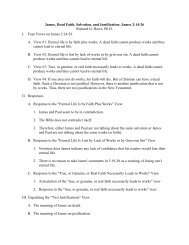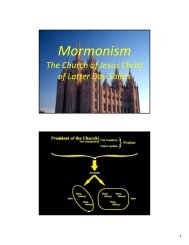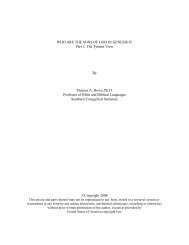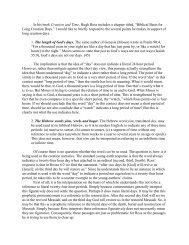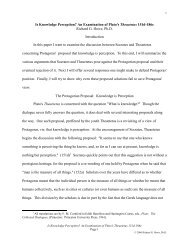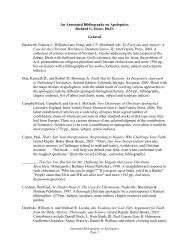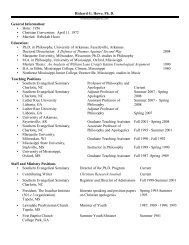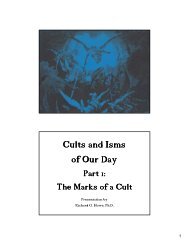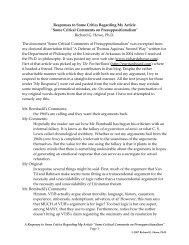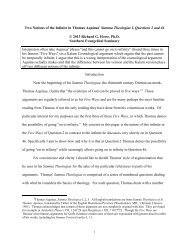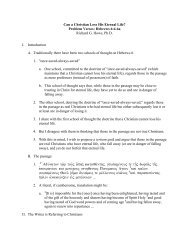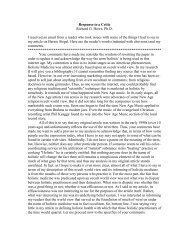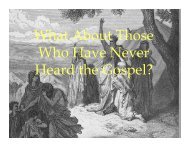Apologetics - Richard G. Howe
Apologetics - Richard G. Howe
Apologetics - Richard G. Howe
- No tags were found...
Create successful ePaper yourself
Turn your PDF publications into a flip-book with our unique Google optimized e-Paper software.
work that assumes knowledge of quantum physics to fully appreciate. (342 pp., subjectindex)Davies, Brian. The Reality of God and the Problem of Evil. London: Continuum, 2006. "Daviessuggests that we should start by attending to certain 'basics'—by asking why me mighthave reason to believe in God in the first place and by considering what our knowledge ofGod tell us (or does not tell us) about his nature. He then considers a number of famousattempts to deal with the problem of evil, and suggests that almost all of them fall short invarious ways." [from the cover] (264 pp., endnotes, bibliography, index)________. Thomas Aquinas on God and Evil. Oxford: Oxford University Press, 2011. "The firstin-depth study of Saint Thomas Aquinas's thoughts on God and evil … a clear andengaging guide for anyone who struggles with the relation of God and theology to theproblem of evil." [from the back cover] (172 pp., endnotes, bibliography, index)Dembski, William A. and Michael R. Licona. Evidence for God: Fifty Arguments for Faith fromthe Bible, History, Philosophy, and Science. Grand Rapids: Baker Books, 2010.Contributions from Darrell Bock, L. Russ Bush, III, Paul Copan, Gary R. Habermas andothers. (272 pp., end notes)Day, Vox. The Irrational Atheist: Dissecting the Unholy Trinity of Dawkins, Harris, andHitchens. Dallas: Benbella Books, 2008. "In this devastating critique of the anti-theisticarguments … Day skillfully demonstrates to even the most skeptical reader that the NewAtheists are no champions of Reason, but rather abandon Reason in their argumentsagainst religion." [from the flyleaf] (305 pp., footnotes, appendices, bibliography)Dolezal, James E. God without Parts: Divine Simplicity and the Metaphysics of God'sAbsoluteness. Eugene: Pickwick Publications, 2011. "Dolezel [examines] theimplications of divine simplicity for God's existence, attributes, knowledge, and will.Dolezal interacts extensively with older writers, such as Thomas Aquinas and theReformed scholastics, as well as more recent philosophers and theologians." [from theback cover] (239 pp., footnotes, bibliography, index)Feser, Edward. The Last Superstition: A Refutation of the New Atheism. South Bend: St.Augustine's Press, 2008. A powerful philosophical critique of the bankruptcy ofcontemporary mechanistic science and its role in the rising of the New Atheism. (299 pp.,end notes, index)Ganssle, Gregory E. Thinking about God: First Steps in Philosophy. Downers Grove, IL:InterVarsity Press, 2004. An excellent introduction to philosophy of religion. Gansslecovers issues such as the existence and attributes of God and the problem of evil. He alsolays out the elements of the current open theism debate. (187 pp., bibliography, index)Geisler, Norman L. Creating God in the Image of Man? The New "Open" View of God-Neotheism's Dangerous Drift. Minneapolis: Bethany House Publishers, 1997. ExposesBibliography on Christian <strong>Apologetics</strong>Page 7© 2012 <strong>Richard</strong> G. <strong>Howe</strong>



